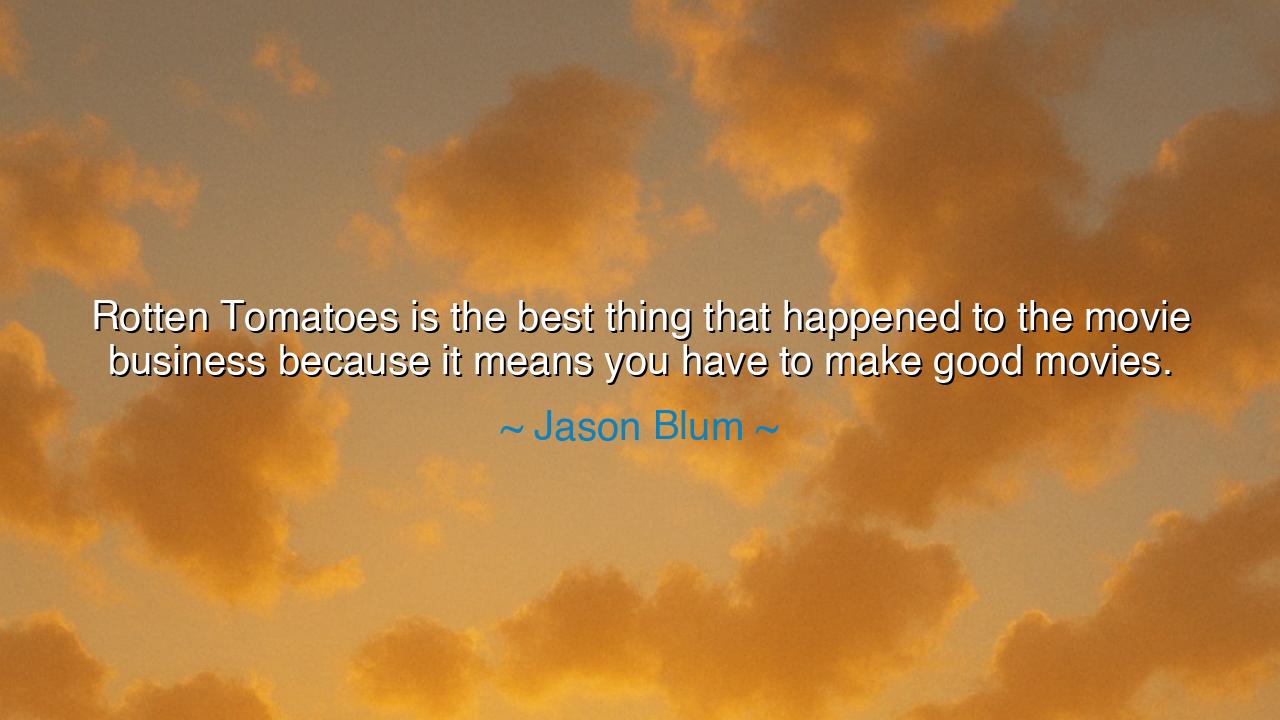
Rotten Tomatoes is the best thing that happened to the movie
Rotten Tomatoes is the best thing that happened to the movie business because it means you have to make good movies.






Ah, the words of Jason Blum, a man whose insight into the evolving world of film shines with clarity and foresight: "Rotten Tomatoes is the best thing that happened to the movie business because it means you have to make good movies." This simple yet profound statement speaks to a truth that has existed since the dawn of storytelling—that the quality of the story, the honesty of the performance, and the craftsmanship of the film itself will always determine its place in the world. Rotten Tomatoes, the great arbiter of public opinion, has become a beacon in the ever-changing landscape of cinema. It demands more than just spectacle; it demands substance, and it rewards those films that rise to the occasion with excellence.
In ancient times, the Greek playwrights knew well the power of criticism. The works of Aeschylus, Sophocles, and Euripides were not only performed for the enjoyment of the audience but also for the judgment of their peers. Theaters in ancient Athens were spaces of intellectual engagement, where the people not only watched a performance but critiqued it. The chorus, the most direct voice of the public, often reflected the moral judgments of the community. These playwrights knew that their work would not be celebrated for its mere entertainment value but would be judged on its merit, its wisdom, and its truth. Similarly, Rotten Tomatoes has become the modern-day chorus, a collective voice that offers both praise and critique in equal measure.
The wisdom of Blum's words lies in the understanding that audience accountability has always been a part of the creative process. Just as the great orators of ancient Greece, like Demosthenes, had to ensure that their words resonated with the people, so too must filmmakers ensure their work resonates with today’s audience. Gone are the days when the powers of the studio could dictate what the people consumed without the people’s voice being heard. Rotten Tomatoes is a reflection of this new era, where audiences, through their collective voice, hold creators to a higher standard. This democratization of critique means that the quality of a film matters more than ever before. Blum’s assertion speaks not just of a tool for measurement, but of a force that elevates the art of filmmaking, ensuring that only the truly exceptional rise to the top.
Consider the story of Alexander the Great, who sought not only to conquer lands but also to earn the respect of the people he sought to rule. In his early campaigns, he faced opposition not only from armies but from the hearts and minds of those he encountered. Alexander knew that true greatness could not be achieved through mere force; it had to be earned through wisdom, strategy, and the respect of his people. Similarly, a film, no matter how much money or marketing it may have behind it, must earn the respect of its audience through the quality of its storytelling and the depth of its execution. Rotten Tomatoes holds the power to reward those films that achieve this standard and weed out those that fall short.
This call to make good movies is not just a challenge to filmmakers but a challenge to all creators. In the ancient world, artisans, philosophers, and architects knew that their work would be judged, not merely on its ability to please the eye or ear, but on the integrity and depth it carried. The great pyramid builders of Egypt did not simply build structures; they sought to create monuments that would endure for millennia, that would reflect the wisdom of their time. So too must modern creators—whether in film, art, or writing—seek to make works of substance that can withstand the scrutiny of time and the test of the public eye.
The true lesson in Blum’s words is this: do not shy away from critique, but embrace it as a guide to greatness. Whether we are filmmakers, artists, or anyone seeking to create something of value, we must remember that quality is paramount. We are all subject to the judgment of those who come after us, and their voices, whether they come through tools like Rotten Tomatoes or through the personal experiences they carry, are what will define our legacy. Let us create with integrity, with passion, and with the knowledge that the work we do must stand on its own merit, not on the illusion of external validation.
Thus, the call to action is clear: make your work meaningful, regardless of the medium. Strive for excellence, knowing that the eyes of the world are watching, and that in the end, it is the substance of what you create that will carry the greatest weight. Like Bergman or the ancient builders, ensure that your work is not simply a product to be consumed but a testament to the craft, something that speaks to future generations with truth, depth, and resonance. And as you do so, you will not only satisfy the expectations of today’s audience but earn the respect that will make your work endure.






AAdministratorAdministrator
Welcome, honored guests. Please leave a comment, we will respond soon